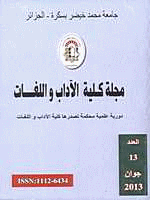Class Size Impact on Formative Assessment in the LMD System
Résumé
لقد أعطت الإصلاحات الجديدة التقويم مكانة مميزة لأهميته . ويعتمد نظام ل،م،د على المجهود الفردي للطالب، و يحتاج هذا الأخير أساسا لمنهجية جديدة في التقويم .إن التقويم التكويني هو ضالتنا في ورقة البحث هذه. و بما أن مقاييس بعينها (اللسانيات، التعبير الكتابي، و النحو) يصعب تقويم الطالب فيها فرديا؛ فقد كان لزاما علينا دراسة هذه الظاهرة تكمن المشكلة في التعداد الهائل للطلبة.
سنحاول الإجابة على بضعة أسئلة حول مدى تأثير تعداد الطلبة على عملية التقويم و كذا أفضل المقاربات لتطبيق تعليمات نظام ل.م.د و نعتمد أساسا على الاستجوابات مع الأساتذة للإحاطة بالموضوع لنخلص إلى أنه كلما تقلص عدد الطلبة تحسنت عملية التقويم .
Testing is a major in the teaching learning process that should be given a special importance especially with the latest reforms as far as higher education in Algeria is concerned. The latter refers to the implementation of the LMD system that is mainly based on the students personal workload. The focus here is on the “ formative assessment “ that is why in some courses such as linguistics, written expression, and grammar, as teachers we face difficulties in testing our students individually; The problem behind our motivation to write this paper is the large number of student per group .
In other works, if we’d like to works according to the LMD principles, the class size stands as a major factor that makes us think seriously about what we are doing in our language classrooms. In fact , this is the case of the department of letters and foreign language at Mohamed Khider University of Biskra over the last four years . The present paper looks for an answer to the following question; to which extent does the class size affect the test design And what should be done to apply the LMD system principles appropriately ? We believe that if the number of students per group decreases i twill be easy for us as teachers to evaluate our students individually. To reach
Références
Brown, H.D. (2007). Teaching by Principles: An Interactive Approach to Language Pedagogy. Pearson Education.
Brown, S and Knight, P. Assessing Learners in Higher Education. (1994). In Brown, G, Bull, J &Pendlebury, M. Assessing student learning in higher Education. (1997). USA. Routledge.
Lynch, B. K. (1996). Language program evaluation. Cambridge : Cambridge University Press.
Davidson, E.J. (2005). Evaluation Methodology Basics. New park, CA: Sage Publications, Inc.
Scriven, M. (1991) . Evaluation thesaurus. (4 ed). New Park, CA: Sage Publications, Inc.
Pelligrino, Chudowsky, &Glaser. (2001). knowing what Students Know: The Science and Design of education assessment. Washington, D.C.: National.
Sawyer, D.B. (2004). Fundamental Aspects of Interpreter Education. Philadelphia, PA: John Benjamins North America.


